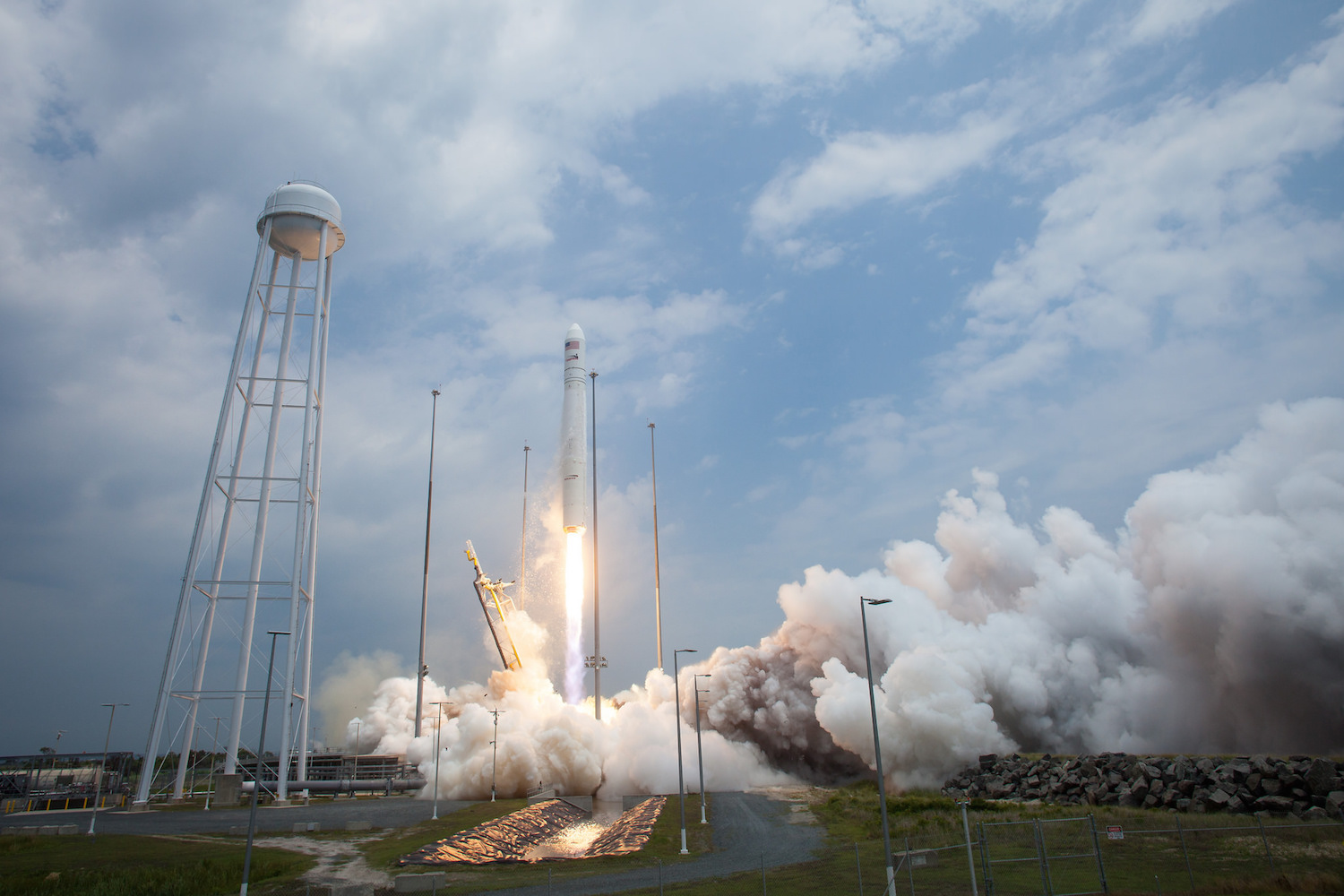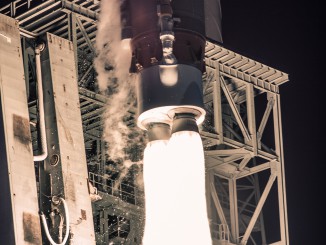
Space station resupply missions launched from Virginia’s Eastern Shore are set to resume in March 2016, after Orbital ATK integrates newly-built rocket engines into the Ukrainian-made booster stage of the company’s commercial Antares rocket and puts it through an on-pad test firing in January.
Orbital ATK selected a new engine — the kerosene-fueled RD-181 made by NPO Energomash of Russia — to replace aging AJ26 engines that, at least initially, appeared to be the cause of a catastrophic launch failure about 15 seconds after a liftoff Oct. 28 that destroyed an automated Cygnus cargo ship heading for the International Space Station.
The first RD-181 engines are due to arrive in the United States in June, Russian officials said last month.
Engineers will modify the first stage of the Antares rocket to accommodate two RD-181 engines in place of two AJ26 engines. Both engines consume the same mix of kerosene and liquid oxygen propellants, minimizing major changes to the rocket’s structure and fuel supply systems.
Officials hope to complete repairs to pad 0A at NASA’s Wallops Flight Facility by the end of the year. The October launch failure caused an estimated $20 million in damage to the launch pad, which is owned and operated by the Mid-Atlantic Regional Spaceport run by the state of Virginia.
This year’s federal budget passed in December included $20 million to help pay for the repairs.
If the launch complex and rocket are ready, Orbital ATK has targeted the return-to-flight of Antares for March 1, 2016, according to David Thompson, the company’s president and CEO.
“What we are going to do in advance of that, in January of next year, is we’re going to take the first stage of Antares out to the launch pad with the new engines and do a flight readiness firing, somewhat similar to what we did back in early 2013, in advance of the first Antares flight,” Thompson said. “But other than that, unless something came up there that was surprising, we should then be able to proceed pretty expeditiously to the first launch of the re-engineered vehicle in March of next year, and that will have a full cargo load on-board.”
Speaking to investment analysts Thursday in the first quarterly earnings call since the merger of Orbital Sciences Corp. and ATK closed Feb. 9, Thompson said the company is on track to have its next Cygnus supply ship ready for launch in October aboard an Atlas 5 rocket.
The mission could slip to November due to space station traffic, Thompson said.
“NASA may want us to go in October, or they may want us to delay until November based on other activities at the station, but we are aiming to be ready to go right about the first of October,” Thompson said.
Using its own capital, Orbital ATK purchased an Atlas 5 rocket from United Launch Alliance in the aftermath of the Antares launch failure to ensure its cargo missions continued flying to the space station while the Antares was grounded.
The company has a $1.9 billion Commercial Resupply Services contract with NASA that originally covered eight resupply flights through the end of 2016, carrying up 20 metric tons — or about 44,000 pounds — of provisions, experiments and other gear to the six-person crews living on the space station.
Orbital ATK now says it can accomplish its contractual commitment in seven flights, thanks to the extra lifting capability of ULA’s Atlas 5 rocket.
The Cygnus spacecraft set for launch late this year will feature several enhancements, including additional volume for pressurized cargo and a new solar panel design to generate electricity.
“We are still on track to complete all the deliveries, as required under the original (cargo) contract, by the end of 2016, and we still see that being accomplished with no adverse financial impacts to the company,” Thompson told investment analysts.
The investigation into the cause of the Oct. 28 Antares launch failure is still ongoing, Thompson said.
A story published by Reuters on Friday said debris left in a fuel tank may have triggered the mishap, which Orbital ATK officials said in November originated in the turbopump of one of the rocket’s AJ26 engines.
After pointing at the engine as the likely culprit for the failure, Orbital ATK decided to replace the AJ26 powerplant with a newly-built engine, ultimately selecting the RD-181.
The AJ26 engine was supplied by Aerojet Rocketdyne, but originally manufactured in Russia in the early 1970s for the Soviet-era N1 moon rocket. The Soviet lunar program was canceled after a series of launch failures, and the engines — called the NK-33 in Russia — were put in storage until they were imported to the United States in the 1990s.
Warren Boley, president of Aerojet Rocketdyne, said in a Feb. 4 interview that Orbital ATK has suspended work under their contract for the AJ26 engine as the deal moves toward termination.
Boley said the investigation into the launch failure was still at least several weeks from completion, and he offered no insight into the leading candidates for the root cause.
Another topic getting attention from Orbital ATK executives is the situation in Ukraine, where the Antares rocket’s core structure is built by Yuzhmash at a plant in the eastern Ukrainian city of Dnipropetrovsk.
“It is an area we are watching closely, including with near full-time presence at their facilities,” Thompson said. “We need five additional first stage cores over the course of the next roughly two to two-and-a-half years. Three of those are complete. Two are almost complete.
“Also we do, although I don’t probably want to get into a lot of detail on it, we do have a fallback plan if things really deteriorated there,” Thompson said. “Right now that does not appear to be happening, but it is something we are watching pretty carefully.”
Despite the grounding of Orbital ATK’s space station resupply program, the cargo contract was the company’s second-largest as measured in revenue last year, contributing nearly $300 million to Orbital ATK’s bottom line.
The largest program in Orbital ATK’s portfolio in 2014 was a contract with the U.S. Army for small-caliber ammunition, a deal inherited from ATK’s legacy business. Its revenue was about $430 million last year, Thompson said.
Orbital ATK’s role to supply the solid rocket boosters for NASA’s Space Launch System heavy-lift launcher rounded out the list of the company’s three biggest programs at approximately $250 million revenue generated last year, according to Thompson.
Follow Stephen Clark on Twitter: @StephenClark1.



